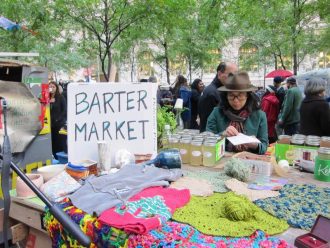“You have much more than your bank accounts. You have your mind and your hands.”
You won’t likely see it headlining The Drudge Report, making its rounds in talk radio, or featured for discussion on cable news panels, but the October (2011) New York Times story covering the emergence of a barter, trade, and alternative currency economy in Greece is one of the most important stories of our day.
The Silver Circle Movie is a story about a band of rebels who vow to take back their freedom amid the economic and political ruins of a catastrophic monetary collapse, but our fictional movie’s predictions for America’s not-so-distant future are the real world economic realities in Greece right now, and the New York Times piece tells the story of real-life rebels taking their future, their prosperity, and their economic freedom back into their own hands, bucking the Eurozone’s fiat monetary system in favor of providing real value in exchange for real value:
[pro_ad_display_adzone id=”110028″]
“The first time he bought eggs, milk and jam at an outdoor market using not euros but an informal barter currency, Theodoros Mavridis, an unemployed electrician, was thrilled.
‘I felt liberated, I felt free for the first time,” Mr. Mavridis said in a recent interview at a cafe in this port city in central Greece. “I instinctively reached into my pocket, but there was no need to.’
Mr. Mavridis is a co-founder of a growing network here in Volos that uses a so-called Local Alternative Unit, or TEM in Greek, to exchange goods and services — language classes, baby-sitting, computer support, home-cooked meals — and to receive discounts at some local businesses.”
In Greece today, the real rebels aren’t the thousands of protesters angry at the government’s austerity measures, but these few honest, rugged souls who are flourishing on the merits of their own hard work, innovation, and cooperation with others in their local community. These emerging barter and alternative currency networks are happening at the intersection of the most stalwart conservative values and the most ardent hippie ideals:
“Part alternative currency, part barter system, part open-air market, the Volos network has grown exponentially in the past year, from 50 to 400 members. It is one of several such groups cropping up around the country, as Greeks squeezed by large wage cuts, tax increases and growing fears about whether they will continue to use the euro have looked for creative ways to cope with a radically changing economic landscape.”
The new Greek barter economy combines and exemplifies the influences of decentralization, free markets, a strong work ethic, and rugged individualism, as well as the ideals of localism, sustainable living, cooperation, and community organization –all shot through with a healthy dose of the Silicon Valley start-up mentality: innovative, problem-solving, entrepreneurial, and full of bright optimism instead of the fear and resignation that characterizes so many markets and communities today.
People like Theodoros Mavridis are realizing a great new opportunity for sound money advocates and opening up a new front in the war against centralized fiat currencies. One of the fiat system’s most visible opponents is U.S. Congressman Ron Paul (R-TX), who has mobilized an impressive coalition of activists working to publicly audit and eventually abolish the central bank in America – but what if that were as unnecessary as abolishing the U.S. Postal Service?
What if the alternative currencies and barter economies created by people like Theodoros Mavridis simply grew to replace centrally-issued paper currencies as the predominant monetary products the same way email, companies like FedEx, and even text messaging have come to replace centralized, government-sponsored services for exchanging parcels and information? Not as the result of some great ideological revolution, followed by a major political reform, but simply because the alternative works better and people like it more?
As for the feasibility of such a future, sound money advocates the world over can take hope in the fact that the Greek government is not only not hostile to these locally emerging systems of money and exchange, they’re even trying to help:
“Even the government is taking notice. Last week, [the Greek] Parliament passed a law sponsored by the Labor Ministry to encourage the creation of ‘alternative forms of entrepreneurship and local development,’ including networks based on an exchange of goods and services. The law for the first time fills in a regulatory gray area, giving such groups nonprofit status.”
Here at the Silver Circle Movie project, our hats are off to these true revolutionaries, who don’t see their actions as revolutionary. Here in the cradle of Western civilization, suffering from the growing pains of Western civilization’s adolescence, these Greek citizens are just doing what human beings have done for thousands of years: using their minds and their hands to make their lives better.
[pro_ad_display_adzone id=”110027″]







